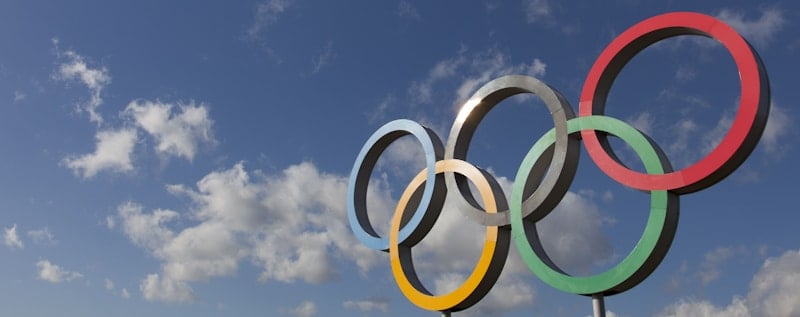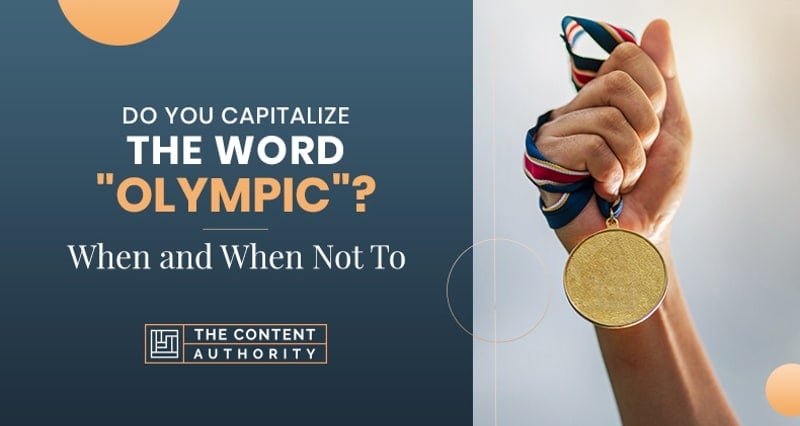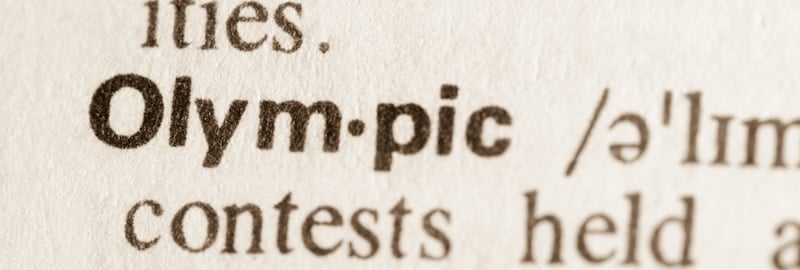The Olympics are a time of great revelry so it should come as no surprise that the event has a language all of its own – full of words and grammar nuances too. One thing this may leave you wondering is do you capitalize “olympic.”
Whether or not you capitalize the word “olympic” has to do with how you’re using it. If you’re using it to reference the international athletic contest, then you should always capitalize it (e.g. Winter Olympics, Olympic games). However, when you are using the word by itself you should not capitalize it.

Etymology of the Word “Olympic”
The word “olympic” stems from the Greek word Olympikos (Olympos). Both of these words’ origins are unknown. In circa 1600 the word “olympic” was used as a reference to Mount Olympus. This is the mountain that’s located in Thessaly. Many people believe that this is the home to the greater Greek gods. It was also used as a reference to Olympia. This is a town or district that was located in Elis, which was part of ancient Greece. Here Zeus’ famous temple was located. Athletic contests were held here in 776 B.C.E. in honor of him. These games were then hosted every four years thereafter.
The games were celebrated every fourth year for several hundred years until the early Christian era when they were abolished. This is because the early Olympic games were used as a way of celebrating the Greek gods. In 1896 the games were revived, this time as a way of celebrating the Olympians from around the world and their talents and was a source of great joviality. The only years in which the Olympics weren’t hosted were 1916 (World War I), 1940, and 1944 (World War II).
Grammar Rules for The Olympic Games
There are many questions surrounding the grammar that is used when referencing the Olympic games. For instance, do you use a singular or a plural verb? When are you supposed to capitalize any of the words that are associated with the Olympic Games? What about things like adjectives and hyphens?
Singular vs. Plural
When you read most publications or talk to most people you’ll see the Olympics are referred to as singular but the Olympic Games are referred to as plural. The idea here is that the Olympics is one event while the Olympic Games is used to refer to the various individual sporting events that occur throughout the week-long event. This is why you’ll often see the Olympics take both a singular and a plural verb.
The Capitalization of Olympic Words
There are some words that you should always capitalize when you’re discussing the Olympic, these words include:
- Winter Olympics
- Olympics
- Olympic
- Olympic Games
In short, you’ll want to make sure to capitalize the Olympics when it’s an event name. You should also capitalize any words that are associated with the name of the Olympics. However, you don’t want to capitalize other related words. For instance:
- Winter Olympics
- 2021 Summer Olympic Games
- the Olympics
- Olympic podium
- Olympic torch
- Olympic flag
Country Names, Nationalities and Languages
You capitalize country names, nationalities, and languages because they’re all proper nouns (a person, place, or thing that refers to a single entity). Some examples of this include:
- Canada
- Russian
- English
Sports and Sporting Event Names
You typically wouldn’t capitalize the name of a sport or a sporting event (e.g. hockey, cross-country skiing). The only difference occurs when you use the word Nordic with them (e.g. Nordic combined). This is because the word Nordic is used in referring to a country or an area which means that it’s a proper noun.
The Word “The”
The Chicago Manual of Style 16th ed. Says that you should never capitalize the word “the” within a sentence. The only time you should capitalize it is when the word “the” is the first word of a sentence.
- I’m going to watch the Olympics on T.V.
- The Olympics are on T.V.
Using “Olympics” as an Adjective
Adjectives are words or phrases that are used to describe nouns (persons, places, or things). The adjective form of the word Olympics is Olympic. You should always capitalize it and use a hyphen when using it as a multiple word adjective (e.g. Olympic-medal winner), especially when it precedes a noun. Remember, the adjective form of a word very rarely ends with an “s.”
When you’re writing lesson plans it’s common to use the noun form of the word Olympics instead of the adjective form. For this reason, you would capitalize the word Olympics. This is also true when you’re referring to the word sports. It’s more natural to say “Sports lesson plan” not “Sport lesson plan” or even “Sporting lesson plan.” You should also capitalize any word that’s in this position because it’s the title of a lesson. If you’re finding it a bit challenging to understand this rule of grammar then consider rewording what you’re saying so that instead you say “a lesson plan on the Olympics” or “a lesson plan on sports.” Herein you’d very clearly need the noun form so you wouldn’t capitalize the topic of a regular word because then it isn’t acting as a title.
Other Uses of the Word “Olympic”
Now that we understand the proper rules of grammar for the word Olympic, it’s important to understand what the proper rules of grammar are in reference to other forms of this word. These include:
- Olympiad is always capitalized. It is used to refer to a four year period that begins on January 1 of the Olympic year. Starting with the 1896 Athens Games, these are consecutively numbered using Roman numerals. For instance: The XXXII Olympiad games will be hosted in Tokyo Japan in 2021.
- Olympian is always capitalized. This is used when referring to any athlete who’s been to the Olympics.
- Tokyo Games, Tokyo Olympics, 2021 Olympics, 2021 Games, Tokyo Summer Olympics, Tokyo Summer Games are all capitalized
Proper Grammar for Other Words Related to the Olympics
Besides the word Olympics, there are a lot of other words that are used in relation to the games. These words and terms each have their own unique grammar rules associated with them too.
Olympic terms
Olympic Park
This is a 1-square-mile site that is built for each Olympic game. Since it is a proper noun you want to make sure that you always capitalize it.
Olympic Village
Located next to the Olympic Park, this is where the athletes live throughout the week-long competition. Since it’s a proper noun you should always capitalize it. However, if you choose to use the term “athlete’s village” to refer to this area, it should not be capitalized.
Olympic opening ceremony and closing ceremony
This is the singular form of but together they’re the Olympic ceremonies (plural). The only word that gets capitalized here is the word Olympic. This is used in referring to the ceremonies that are held at the beginning and ending of the games (respectively) in the 80,000-seat main stadium.
Symbols and Culture
The culture and symbols that surround the games are plentiful. You’ll want to know about all of them so you can use them properly in your writing. They include:
- Olympic rings: These are the five interlocking rings, each ring symbolizing one of the 5 continents. They’re blue, yellow, black, green and red.
- Olympic motto: This is “Citius, Altius, Fortius” meaning “faster, higher, stronger.”
- Olympic Charter: Written in capital letters since it’s a proper noun, this is the set of rules and principles that govern the International Olympic Committee and the Olympic movement in general.
- Olympic oath: While you may think that this would be written in capitals, it isn’t. This is a solemn promise that athletes make to abide by the rules in the spirit of sportsmanship. In the opening ceremony, one athlete and one judge or referee are chosen to recite it on behalf of all the athletes and officials who are participating in the games.
- Olympism: This word is always capitalized as it’s a proper noun that refers to the philosophy of sport, culture, and education that lies behind the Olympic movement.
- Olympic hymn or anthem: You may think that this would be a proper noun but it isn’t. What it is though is the music that was written by the Greek composer Spyridon Samaras and its accompanying lyrics which were written by the Greek poet Kostis Palamas. The Olympic Hymn is played at both the opening and the closing ceremonies.
Names and Acronyms
There are many names and acronyms that are associated with the Olympic games. Make sure that you write them out fully upon the first reference. Throughout the remainder of your writing, you can simply refer to them by their acronym.
Conclusion
In summary, the word “olympic” brings a great deal of celebration and effort tied to its core. For anyone in the world that has witnessed the Olympic Games, it is of great importance to discuss correctly the topic written or spoken and now you can.
Shawn Manaher is the founder and CEO of The Content Authority. He’s one part content manager, one part writing ninja organizer, and two parts leader of top content creators. You don’t even want to know what he calls pancakes.



